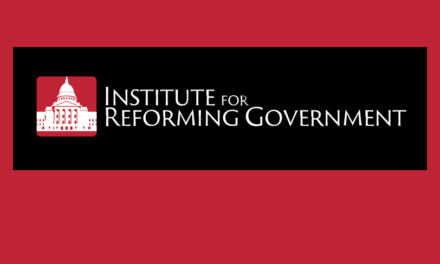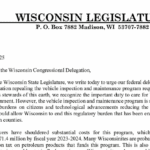Good morning and happy Flag Day.
Let’s end this busy week by getting right to today’s Key Reads.
In Milwaukee last night, seven of the eight members of the school board voted to approve a $1.5 billion budget without a firm understanding of just how bad their finances are. Fox 6 in Milwaukee is reporting that the state Department of Public instruction estimates the state may have previously overpaid MPS by as much as $50 million, an amount that they’d have to claw back from the district in reduced aid going forward.
Meanwhile, the board members also passed the corrective action plan, that MPS and state bureaucrats devised that provides a timeline for MPS to get their financial reporting house in order. Mind you, all this is about finances and transparency. None of the adults at the Milwaukee Public Schools administration or within the DPI in Madison have even touched on the real scandal, that MPS has failed to properly educate a vast number of their students every single year for the last several decades. We have several updates on our website on this abysmal catastrophe.
Including this exclusive:
Quicker than a recall: How the Milwaukee Common Council could remove members of the MPS Board | Dairyland Sentinel
Will the 2024-25 Fiscal Year Budget passed by the MPS Board be the last spending plan voted on by many of its members? The Board just passed the $1.5 billion budget on a 7-1 vote.
Membership on that board could soon be vastly different.
As first reported here at Dairyland Sentinel earlier this week, the Milwaukee Public Schools have a unique relationship with City of Milwaukee government. Because it is designated as a city of first class size in the state statutes, the laws governing MPS operations include significant involvement of the City.
But can the Common Council really remove elected members of the school board? Well, according to an analysis conducted by Wisconsinites for Law & Liberty indeed it can.
WILL spells it out in a six-page memo, recently obtained by Dairyland Sentinel.
…So, according to WILL’s legal analysis, if a complaint is filed with the Common Council by a City of Milwaukee resident, the Common Council would hear the complaint and it would take a three fourths vote of all members to remove a member of the Milwaukee Public Schools Board for cause.
This confirms the assertion made by a columnist in Dairyland Sentinel earlier this week.
DPI and MPS craft corrective action plan that focuses on bureaucratic processes, children left out of the equation | A Dairyland Sentinel Perspectives Column
By Brian Fraley | A Dairyland Sentinel Perspective
State Superintendent Jill Underly put out a written press statement today (Thursday) wherein she shared startling, detailed statistics regarding the historic failure of DPI and MPS to educate hundreds of thousands of Milwaukee Public School students over the last several decades. She included information regarding the district’s increased spending and the flow of state aid provided to MPS and how these monies did not get directed to classroom instruction and did not bring about corresponding gains in math, science and reading scores. Underly not only took responsibility for her and her department’s failure, she explained how Governor Tony Evers has also been a part of the problem, dating back a quarter of a century to when he began to work at the Department of Public Instruction. She was critical of the bloat within MPS and expressed frustration that the district didn’t focus on educational basics and continued to fail to prepare a large percentage of its students to lead productive and successful lives after they leave MPS.
Yeah, right.
In actuality, Underly issued a one paragraph statement about MPS. It reads, in part:
“I am confident the MPS Board of School Directors will approve and implement the corrective action plan we sent them today.”
DPI and the governor are upset that the district hasn’t filed the proper financial paperwork with the proper bureaucrats, and that’s where they want to keep the focus. As soon as the MPS Board votes to accept the plan, they’ll get the millions in state aid DPI withheld earlier this month.
Citizens of Milwaukee and all of Wisconsin should be concerned about government transparency. We are right to wonder whether or not MPS has cooked the books and if DPI DPI fraudulently sent them tens of millions of dollars in unwarranted state aid that should have gone to other districts. We need to understand the statewide property tax and budget ramifications of this malfeasance.
But the news media is helping the Evers / DPI / MPS crisis communication political response by not focusing on the larger scandal at MPS. They want the focus to be on inputs, not outcomes.
Why? Simple. the district continues to fail the families they are supposed to serve.
Student performance is abysmal. Test scores and graduation rates and habitual truancy figures are much more important than whether or not some columns in a spreadsheet were incorrectly uploaded to a server in Madison.
Where is that plan? Governor Evers says he’s going to wait for the results of his private audits before suggesting any changes in how MPS is governed. The Evers Audits are reviews whose parameters will be set by his administration, which will not look at DPI’s complicity in the failure of MPS, and haven’t yet even been put out to bid.
There is no timeline for the start and end of this review. It could be years before any structural change comes from Madison.
That’s the whole point. Drag this out. Let things cool off. Ride out the storm.
For what it’s worth, here is the 29-page corrective action plan the bureaucrats have agreed to implement.
The words that never appear in this plan?
Student
Children
Achievement
Grades
Graduation rate
Learn
Quality
This is a plan about process, not about people, not about kids. It may be needed, but it doesn’t scratch the surface of the scandal at DPI and MPS.
One other word missing from the plan?
Hope.
Administrators within the UW System continue to right-size operations as they deal with declining enrollment.
UW-Oshkosh latest to close branch campus | The Center Square
The Universities of Wisconsin are getting smaller, again.
UW-Oshkosh on Thursday became the latest school to announce it is closing its branch campus. The UW-O campus in the Fox Cities will close at the end of next year’s school year.
“We reach this decision after spending a year analyzing UWO Fox Cities enrollment, the region’s and state’s changing demographics, student participation rates, the regional higher-education landscape, potential for new and unique academic offerings, and economic trends in the competitive Fox Valley marketplace,” Oshkosh Chancellor Andrew Leavitt said in a statement. “In the end, we made a difficult but responsible decision.”
Oshkosh’s Fox Cities campus is the sixth branch campus to be closed over the past two years. And, like the others, it comes after a massive drop in enrollment.
UW numbers show the Oshkosh Fox Cities campus had 1,629 students in 2018, but just 555 last fall.
UW-Oshkosh leaders told university regents recently that enrollment was projected to be under 100 students by 2032.
The closing also comes after the university said last week that Oshkosh had spent all of its cash reserves and is still looking at an $8.6 million deficit for the 2024-2025 school year. That is the largest deficit of any UW campus.
“UW Oshkosh is working to ensure it has a bright future, which requires tough decisions now. Unfortunately, the analysis is that the market and enrollment cannot sustain the Fox Cities Campus moving forward,” UW President Jay Rothman said in a statement.
…The Oshkosh Fox Cities campus joins UW-Platteville Richland, UW-Milwaukee at Washington County, UW-Oshkosh Fond du Lac and UW-Green Bay Marinette which all closed this year. UW-Milwaukee’s campus in Waukesha is set to close at the end of the next school year.
As we mentioned, above, today is Flag Day. It’s a celebration that began right here in Wisconsin.
Flag Day and Waubeka | Dairyland Sentinel
Flag Day is celebrated annually on June 14th in the United States to honor the adoption of the official American flag. The day holds significance as a symbol of unity, pride, and patriotism. The origins of Flag Day can be traced back to the late 19th century and a small town in Southeastern Wisconsin.
The roots of Flag Day can be found in the efforts a schoolteacher named Bernard Cigrand, who is considered one of the early advocates for the celebration of the American flag. Born in Waubeka, Wisconsin in 1866, Cigrand was inspired by his love for the flag and began promoting the idea of honoring it with a dedicated day. He believed that the flag represented the ideals and values of the nation and deserved special recognition.
In 1885, Cigrand held the first recognized Flag Day celebration in his classroom at Stony Hill School in Waubeka. This event would mark the beginning of a movement to establish a national day to honor the flag. Over the years, even after he moved away, Cigrand continued to champion the cause, writing articles and delivering speeches advocating for the importance of recognizing the flag’s significance.
In 1916, President Woodrow Wilson issued a proclamation officially establishing June 14th as Flag Day, solidifying its place in the national calendar. The date of June 14th was chosen because it marks the anniversary of the adoption of the Stars and Stripes as the official flag of the United States in 1777.
Flag Day is celebrated in various ways across the country, with communities coming together to honor the flag and the principles it represents. But nowhere is it more venerated than in Waubeka. in Ozaukee County.
Waubeka has a land area of approximately 5.15 square miles. The population of Waubeka has historically been quite small, as off the most recent census data, Waubeka had a population of around 600 residents.
This past Sunday, June 9th, Waubeka celebrated it’s 78th Flag Day celebration with it’s customary parade, family festivities and fireworks.
Flag Day serves as a reminder of the importance of the American flag as a symbol of freedom, unity, and democracy. It is a day to reflect on the sacrifices made to uphold these ideals and to reaffirm our commitment to the principles that the flag represents. Through celebration and reflection, Flag Day continues to be a meaningful observance that brings people together in honor of the flag and the nation it symbolizes.
And the day all began, right here, in Wisconsin!
It has been quite a busy few days.
Did you notice that we’ve not heard much about the scandal in Wisconsin’s prison system this week? It was just last week that a warden and eight others were arrested and charged in conjunction with poor prisoner treatment, including a homicide, in Waupun. We’ll continue to follow this story, as we can’t let the passage of time or other emerging stories push this tragedy from our consciousness.
That also applies to UWM and how the chancellor there coddled the pro-Hamas lawbreakers. We’re staying on that too.
We love this state. We celebrate our cultural traditions and we promote the events, people, employers and civic leaders who make it great. We also bring you stories about those who fail to live up to our high standards. Because expectations for honesty and fairness is also a part of our culture here.
Have a wonderful weekend. It looks like a heat wave may settle in at the start of next week, but we should have a couple of fine days to hit the beach or fire up the back yard grill before then.
We will be back Monday with more Key Reads.
















